- Home
- Ramachandra Guha
India After Gandhi Page 6
India After Gandhi Read online
Page 6
M. A. JINNAH,
Muslim League Presidential Address, 1940
I
DID INDIA HAVE TO be partitioned? When the British left, could they not have left a single country behind? Ever since 1947 such questions have been asked. And in the process of being answered, they bring forth the supplementary question – Why was India partitioned?
The nostalgia for an undivided India has been mostly manifest among people on the Indian side of the border. But there has sometimes been a sense of loss displayed in what has become Pakistan too. Indeed, on 15 August 1947 itself, a veteran Unionist politician wrote of how he wished he
could do anything to save the unity of the Punjab . . . It is heartbreaking to see what is happening . . . It is all due to the policy of liquidating and quitting before any real agreement has been arrived at . . . The fixing of a date for transference of power ruled out any adjustment and vivisection was the only course left . . . We will have to start afresh [but] there is hardly any hope of building things on old lines as communal hatred and mutual destruction are now uppermost in everybody’s mind.1
Why could not the unity of Punjab, or of India, be saved? There have been three rather different answers on offer. The first blames the Congress leadership for underestimating Jinnah and the Muslims. The second blames Jinnah for pursuing his goal of a separate country regardless of human consequences. The third holds the British responsible, claiming that they promoted a divide between Hindus and Muslims to perpetuate their rule.2
All three explanations, or should one say accusations, carry an element of truth. It is true that Nehru and Gandhi made major errors of judgement in their dealings with the Muslim League. In the 1920s Gandhi ignored Jinnah and tried to make common cause with the mullahs. In the 1930s Nehru arrogantly and, as it turned out, falsely, claimed that the Muslim masses would rather follow his socialist credo than a party based on faith. Meanwhile, the Muslims steadily moved over from the Congress to the League. In the 1930s, when Jinnah was willing to make a deal, he was ignored; in the 1940s, with the Muslims solidly behind him, he had no reason to cut a deal at all.
It is also true that some of Jinnah’s political turns defy any explanation other than that of personal ambition. He was once known as an ‘ambassador of Hindu–Muslim unity’ and a practitioner of constitutional politics. Even as he remade himself as a defender of Islam and Muslims, in his personal life he ignored the claims of faith. (He liked his whisky and, according to some accounts, his ham sandwiches too.)3 However, from the late 1930s he assiduously began to stoke religious passions. The process was to culminate in his calling for Direct Action Day, the day that set in train the bloody trail of violence and counter-violence that made Partition inevitable.
Finally, it is also true that the British did welcome and further the animosities between Hindus and Muslims. In March 1925, by which time the anti-colonial struggle had assumed a genuinely popular dimension, the secretary of state for India wrote to the viceroy: ‘I have always placed my highest and most permanent hopes upon the eternity of the Communal Situation.’4 Within England the growth of liberal values placed a premium on the sovereignty of the individual; but in the colonies the individual was always seen as subordinate to the community. This was evident in government employment, where care was taken to balance numbers of Muslim and Hindu staff, and in politics, where the British introduced communal electorates, such that Muslims voted exclusively for other Muslims. Most British officials were predisposed to prefer Muslims, for, compared with Hindus, their forms of worship and ways of life were less alien. Overall, colonial policy deepened religious divisions, which helped consolidate the white man’s rule.
The short-sightedness of Congress, Jinnah’s ambition, Britain’s amorality and cynicism – all these might have played their part, but at least by the early 1940s Partition was written into the logic of Indian history. Even if the British had not encouraged communal electorates, the onset of modern electoral politics would have encouraged the creation of community vote banks. Muslims were increasingly persuaded to think of themselves as, indeed, ‘Muslims’. As late as 1927 the Muslim League had a mere 1,300 members. By 1944 it had more than half a million in Bengal alone (Punjab had 200,000). Muslims of all classes flocked to the League. Artisans, workers, professionals, businessmen – all rallied to the call of ‘Islam in Danger’, fearing the prospect, in a united India, of a ‘Brahmin Bania Raj’.5
The call for Pakistan was first made formally by the Muslim League in March 1940. The Second World War had kept the question of Pakistan (as of Indian independence more generally) on hold. After the war a Labour government came to power in Great Britain. Unlike the Conservatives, the Labour Party ‘regarded itself as morally committed to speed up the process of independence for India’. On the subject of India, Prime Minister Clement Attlee showed ‘a decisiveness and passion unusual during hiscareer’.6
Some leading Labour politicians had close ties to Congress. These included Sir Stafford Cripps, who in the beginning of 1946 was sent as part of a three-member Cabinet Mission to negotiate the terms of Indian independence. Cripps, and other Labour leaders, would have liked to leave behind a united India for the Congress to govern and guide. But a note prepared for the Mission in December 1945 showed how unlikely this would be. Its author was Penderel Moon, a Fellow of All Souls and sometime member of the Indian Civil Service. Moon pointed out that ‘there is more likelihood of obtaining Hindu consent to Division than Muslim consent to Union’. From the British point of view, ‘to unite India against Muslim wishes would necessarily involve force. To divide India against Hindu wishes would not necessarily involve force; and at worst the force required is likely to be less. The Hindus of Madras, Bombay, U. P, and C. P. may loudly lament their brethren in Bengal and the Punjab being torn from the embrace of Mother India, but they are not likely to have the will or the power to undertake a Crusade on their behalf.’7
The next few months bore out the cold wisdom of these remarks. Early in 1946 elections were held to the various provincial assemblies. These were conducted on a franchise restricted by education and property. About 28 per cent of the adult population was eligible to vote – but this, in a land the size of British India, still amounted to some 41 million people.8
The world over, the rhetoric of modern democratic politics has been marked by two rather opposed rhetorical styles. The first appeals to hope, to popular aspirations for economic prosperity and social peace. The second appeals to fear, to sectional worries about being worsted or swamped by one’s historic enemies. In the elections of 1946 the Congress relied on the rhetoric of hope. It had a strongly positive content to its programme, promising land reforms, workers’ rights, and the like. The Muslim League, on the other hand, relied on the rhetoric of fear. If they did not get a separate homeland, they told the voters, then they would be crushed by the more numerous Hindus in a united India. The League sought, in effect, a referendum on the question of Pakistan. As Jinnah put it in a campaign speech, ‘Elections are the beginning of the end. If the Muslims decide to stand for Pakistan in the coming elections half the battle would have been won. If we fail in the first phase of our war, we shall be finished.’
The leader’s message was energetically carried by the cadres. In Bihar the provincial Muslim League asked the voters to ‘judge whether the bricks of votes should be used in the preparation of a fort of “Ram Raj” or for the construction of a building for the independence of Muslims and Islam’. A League election poster in Punjab offered some meaningful pairs of contrasts: din (the faith) versus dunya (the world); zamir (conscience) versus jagir (property); haqq-koshi (righteousness) versus sufedposhi (office). In each case, the first item stood for Pakistan, the second for Hindustan.
League propaganda also urged voters to overcome sectarian divisions of caste and clan. ‘Unite on Islam – Become One’, declared one poster. The Muslims were asked to act and vote as a single qaum, or community. A vital role was played by student volunteers, who tr
aversed the countryside canvassing votes from house to house.
The election results were a striking vindication of the League’s campaign. Across India, in province after province, the Congress did exceedingly well in the general category, but the Muslim seats were swept by the League, fighting on the single issue of a separate state for Muslims. In the province of Bengal, for example, the League won 114 out of 119 seats reserved for Muslims; since the strength of the assembly was 250, it required little effort to cobble together a majority. In the United Provinces the Congress won 153 seats out of a total of 228, and so formed the government. But within this larger victory there was a significant defeat, for of the 66 Muslim seats on offer in the United Provinces the League won a resounding 54. Even more striking were the results in the southern province of Madras, which even the most devoted follower of Jinnah would not claim for a prospective Pakistan. Here the Congress won 165 out of 215 seats, but the League won all 29 seats reserved for Muslims. Overall, in the general constituencies, the Congress won 80.9 per cent of the votes, whereas in the seats reserved for Muslims the League garnered74.7 per cent.
After the results had come in, the League’s paper, Dawn, proclaimed that ‘Those who have been elected this time to the Legislatures have been charged by the voters with the duty . . . of winning Pakistan. Within and outside the Provincial and Central Assemblies and Councils that and that alone is now the “priority job”. The time for decision is over; the time for action has come.’
This was written on 7 April 1946. Three days later Jinnah convened a meeting in Delhi of the 400 legislators elected on the Muslim League ticket. This convention reiterated the call for an independent Pakistan. However, in early May Jinnah attended a conference in Simla, where attempts were being made by the Cabinet Mission to find a unitary solution. Through the next two months various drafts were passed round, allowing for one nation-state but with provinces having the option to leave if they so desired. The Congress and the League could not agree on the conditions under which provinces would join or leave the projected union. Another sticking point was Jinnah’s contention that the Congress could not nominate a Muslim as one of its representatives to the talks.9
Jinnah bargained hard, knowing now that he had Muslim popular sentiment behind him. By the end of June 1946 it was clear that no settlement could be reached. The Cabinet Mission returned to London. The League leaders met on 29 July and affirmed that ‘the time has now come for the Muslim nation to resort to direct action in order to achieve Pakistan and assert their just rights and to vindicate their honour and to get rid of the present slavery under the British and contemplated future of Caste Hindu domination’.
Two weeks later was Direct Action Day, and the beginning of the end of the dream of United India.
II
Gandhi was not alone in choosing to mark the day of Independence for India, 15 August 1947, as a day of mourning rather than celebration. Across the border in Pakistan, where independence had come a day earlier, the poet Faiz Ahmad Faiz wrote of
This leprous daybreak, dawn night’s fangs have mangled –
This is not that long-looked for break of day,
Not that clear dawn in quest of which those comrades
Set out, believing that in heaven’s wide void
Somewhere must be the stars’ last halting-place,
Somewhere the verge of night’s slow-washing tide,
Somewhere the anchorage for the ship of heartache.10
The lament here was not so much for the fact of Partition, as for its bloody costs. For at least by the end of 1945, and possibly earlier, some form of Pakistan seemed inevitable. It could not now be stopped by Congress magnanimity or a sudden show of modesty on the part of Jinnah. But the poet’s lament impels us to ask one further question – if Partition had to happen, did it necessarily have to cause so much loss of life?
To answer this, we need to briefly rehearse the events of the last six months of the Raj. On 20 February 1947 the Labour government in London announced that the British would quit India by June 1948, and that the viceroy, Lord Wavell, would be replaced. On 22 March the new viceroy, Lord Mountbatten, assumed office. Over the next few weeks he discussed the terms of the British withdrawal with the relevant parties. He found that most Congress leaders were coming round to the inevitability of Partition. They saw that the ‘immediate independence of the major part of India was preferable to the postponement of the independence of the whole of India’.11 Gandhi made a last-ditch effort to save unity by asking Jinnah to head the first government of free India. But this offer did not have the backing of Congress, and Jinnah did not accept it in any case.
On 2 May the viceroy’s chief of staff, Lord Ismay, was sent to London with a plan for Partition. He obtained Cabinet approval, but the plan had to be redrafted several times on his return, so as to satisfy both Congress and the League. (At one stage Jinnah, brazen to the last, asked for an 800-mile-long corridor through India to link the eastern and western wings of Pakistan.) The revised plan was taken by Mountbatten to the British Cabinet.
All this took the better part of a month. On 3 June Mountbatten, back from London, announced the Partition plan on All-India Radio. He was followed on the microphone by Nehru, Jinnah and Baldev Singh (speaking for the Sikhs). The next morning the viceroy addressed a press conference in the Legislative Assembly building. It was here that he suggested, for the first time, that the British would leave not by June 1948 but by the middle of August 1947, that is, in less than ten weeks.
The decision so dramatically to shorten the time frame of the British withdrawal was taken by Mountbatten himself. His biographer, Philip Ziegler, justified the decision as follows:
Once the principle of partition had been accepted, it was inevitable that communalism would rage freely. The longer the period before the transfer of power, the worse the tension and the greater the threat that violence would spread.Today it was the Punjab, tomorrow Bengal, Hyderabad, or any of the myriad societies in the sub-continent where Hindu and Muslim lived cheek by jowl. Two hundred thousand [dead] could have become two million, even twenty million.12
In fact, even while Ziegler wrote (in 1985), the toll of the Partition violence was estimated at a million dead; some later scholars have suggested the figure is closer to 2 million. How many would it have been if the British had left, as planned, in June 1948? In a blistering attack on Mountbatten’s reputation, Andrew Roberts accuses him of softness and vacillation – ‘whenever he had to exhibit toughness, Mountbatten took the most invertebrate line possible’ – of being unwilling to crack down effectively on communal violence and, more specifically, of understaffing the Punjab Boundary Force and not supplying it with air cover. Contra Ziegler, Roberts is convinced that the ‘over-hasty withdrawal’ led ‘to more rather than fewer deaths’.13
Some contemporary observers also felt that the decision to undo in two months flat an empire built over two centuries was poorly conceived. In the summer of 1947 the man occupying the hottest of hot seats was the governor of the still undivided Punjab, Sir Evan Jenkins. In early May Jenkins wrote to Mountbatten urging him to ‘reconsider the terms of any early announcement embodying a solution of the Indian political problem. In the Punjab we are going to be faced with a complete refusal of the communities to cooperate on any basis at all. It would clearly be futile to announce a partition of the Punjab which no community would accept.’14 The decision was made regardless, and the governor was left with thet task of maintaining law and order while the Punjab was divided. On 30 July he wrote to Mountbatten again, explaining that the prospect of Independence with Partition evoked anger rather than enthusiasm. The Muslims had hoped for the whole of the Punjab, whereas the Sikhs and Hindus were fearful that they would lose Lahore. ‘It would be difficult enough’, archly commented the governor, ‘to partition with in six weeks a country of 30 million people which has been governed as a unit for 98 years, even if all concerned were friendly and anxious to makeprogress.’15
&
nbsp; Jenkins did in fact ask several times for more troops and for a ‘Tactical Reconnaissance Squadron’. One reason there were too few troops available to deal with rioters was that they were busy guarding the paranoid rulers, who were convinced that British civilians would be attacked as soon as the decision to leave was made public. This feeling was widespread among all sections of Europeans in India: among officers, priests, planters, and merchants. In the summerof1946, a young English official wrote to his family that ‘we shall virtually have the whole country against us (for long enough at all events to wipe out our scattered European population) before the show becomes, as inevitably it will, a communal scrap between Hindusand Muslims’.16
To make the protection of British lives the top priority was pretty much state policy. In February 1947 the governor of Bengal said that his ‘first action in the event of an announcement of a date for withdrawal of British power . . . would be to have the troops “standing to” and prepare for a concentration of outlying Europeans at very short notice as soon as hostile reactions began to showthemselves’.17 In fact, in the summer of 1947 white men and women were the safest people in India. No one was interested in killing them.18 But their insecurity meant that many army units were placed near European settlements instead of being freed for riot control elsewhere.
The instinct of self-preservation also lay behind the decision to postpone the Punjab boundary award until after the date of Independence. On 22 July, after a visit to Lahore, Lord Mountbatten wrote to Sir Cyril Radcliffe asking himto hurry things up, for ‘every extra day’ would lessen the risk of disorder. The announcement of the boundary award before Independence would have allowed movements of troops to be made in advance of the transfer of power. The governor of Punjab was also very keen that the award be announced as soon as it was finalized. As it happened, Radcliffe was ready with the award on 9 August itself. However, Mountbatten now changed his mind, and chose to make the award public only after the 15th. His explanation for the delay was strange, to say the least: ‘Without question, the earlier it was published, the more the British would have to bear responsibility for the disturbances which would undoubtedly result.’ By the same token, ‘the later we postponed publication, the less would the inevitable odium react upon the British’.19

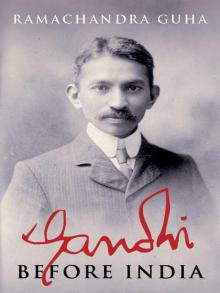 Gandhi Before India
Gandhi Before India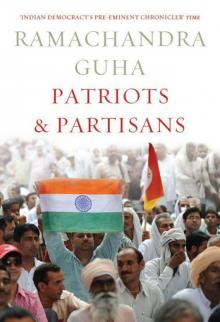 Patriots & Partisans
Patriots & Partisans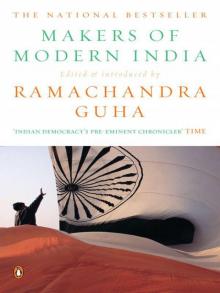 Makers of Modern India
Makers of Modern India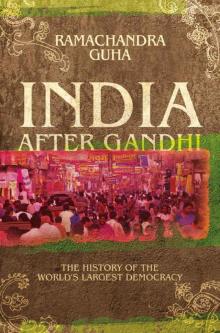 India After Gandhi: The History of the World's Largest Democracy
India After Gandhi: The History of the World's Largest Democracy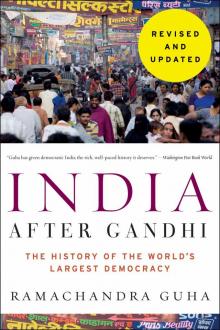 India After Gandhi Revised and Updated Edition
India After Gandhi Revised and Updated Edition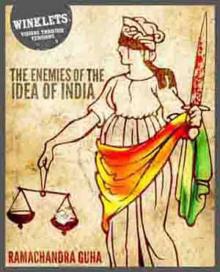 The Enemies of the Idea of India
The Enemies of the Idea of India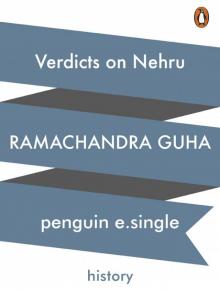 Verdicts on Nehru
Verdicts on Nehru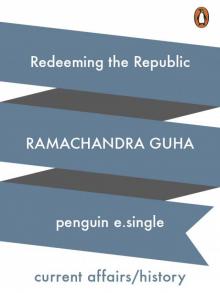 Redeeming the Republic
Redeeming the Republic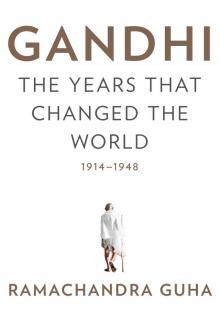 Gandhi
Gandhi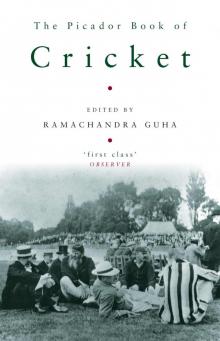 The Picador Book of Cricket
The Picador Book of Cricket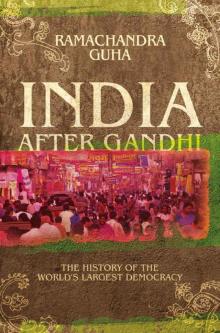 India After Gandhi
India After Gandhi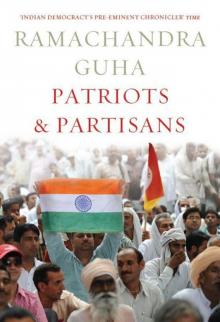 Patriots and Partisans: From Nehru to Hindutva and Beyond
Patriots and Partisans: From Nehru to Hindutva and Beyond